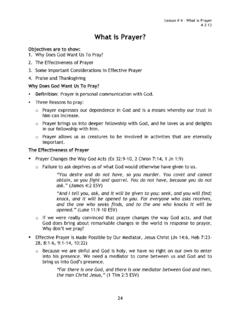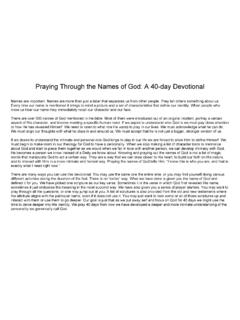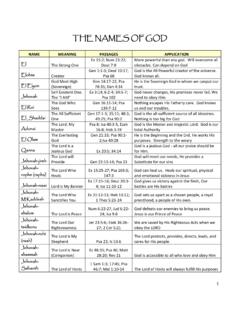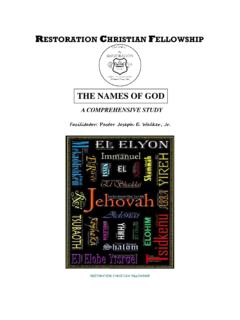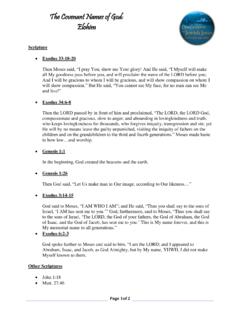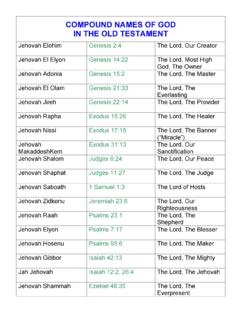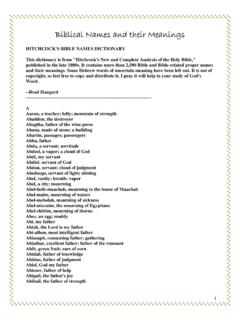Transcription of Names of God - aplaceforyou
1 Names of GodBy Nathan StoneCopyright, 1944, byTHE MOODY BIBLE INSTITUTE OF CHICAGOISBN: 0-8024-5854-837 394038 36 Printed in the United Stales of AmericaCONTENTS1. Elohim2. Jehovah3. E1-Shaddai4. Adonai5. Jehovah-jireh6. Jehovah-rophe7. Jehovah-nissi8. Jehiah-M'Kaddesh9. Jehovah-shalom10. Jehovah-tsidkenu11. Jehovah-rohi12. Jehovah-shammahPRONUNCIATION OF Names OF GODE lohimel-lo-heem'Jehovah je-ho'-vahAdonai a-do-ni'El-Shaddai el shad-di'Jehovah-jireh je-ho'-vah yeer'-ehJehovah-rophe je-ho'-vah ro'-phayJehovah-nissi je-ho'-vah nis-seeJehovah-M'Kaddesh e-ho'-vah m'-kad'-deshJehovah-shalom je-ho'-vah shal-lom'Jehovah-tsidkenu je-ho'-vah tsid-kay'-nooJehovah-rohi je-ho'-vah ro'-eeJehovah-shammah je-ho'-vah sham'-mahINTRODUCTIONTHE CHAPTERS contained in this volume were given originally as a course in the Radio Schoolof the Bible overWMBI, Chicago.
2 A number of requests for their appearance in a morepermanent form, and the fact that comparatively little is written upon a subject worthy of moreinterest and attention, have led to their has been the writer's purpose toshow not only the significance of the Names of God in the OldTestament, but that they find their complement and fulfillment in the person and work of the LordJesus Christ in the New-He who is the effulgence of the glory and the image of the substance ofJehovah, and in whom "dwelleth all the fullness of the Godhead bodily."The writer acknowledges a measure of indebtedness to such works as those of Webb-Peploe,Andrew Jukes, R. B. Girdlestone, and Parkhurst's Hebrew Scripture quotations are from the King James Version and the American Standard Version(ASV), while some are free translations from the little volume goes forth with the hope and prayer that we may better know Him whose nameis above every name , and that some may find in Him that name apart from which "there is noneother name under heaven given among men, whereby we must be saved.
3 "1 ELOHIMTHE FIRST QUESTION in some of our catechisms is, "What is the chief end of man?" and theanswer is, "Man's chief end is to glorify God and to enjoy Him forever." But we will experienceGod in such fashion we will glorify Him and enjoy Him--only in proportion as we know Him. Theknowledge of God is more essential for the Christian, and indeed for all the world, than theknowledge of anything else--yes, of all things together. The prayer of the Lord Jesus for Hisdisciples in John 17:3 was: "And this is life eternal that they should know thee the only true God,and him whom thou didst send, even Jesus Christ" (ASV). And speaking of this, Christ, ourJehovah-Jesus, Paul sums up in Philippians 3:10 the great goal of his life: "That I may know him.""I suppose if sin had not entered the world," says one writer, "the acquisition of the knowledge ofGod would have been the high occupation of man forever and ever.
4 " It is for a lack of knowledgeof God that the prophet Hosea informs his people they are destroyed. And it is from the lack ofknowledge of God that many are without spiritual power or life. There is little real knowledge inthese days of the one, true are many ways, of course, in which we may study God. The God who of old time spoke,"unto the fathers in the prophets by divers portions and in divers manners, hath at the end ofthese days spoken to us in his Son," the epistle to the Hebrews tells us. And this Son, JesusChrist, while on earth said in the great discourse and prayer with God: "I have manifested thyname unto the men which thou gayest me out of the (John 17:6). "And I have declareduntothem thy name , and will declare it: that the love wherewith thou hast loved me may be inthem, and I in them (John 17:26).True, it is in the face of Jesus Christ we best see the glory of God; yet while we are in the fleshwe can only know in part at most.
5 And it behooves us to know all we can learn of God. All theScriptures are profitable to us for instruction and edification, but perhaps not very many peopleknow much about the person of God as revealed in His Names . Surely a study of these namesshould be a most profitable way of increasing that Moses received a commission from God to go to His oppressed people in Egypt anddeliver them from bondage, he said: "When I come unto the children of Israel, and shall say untothem, The God of your fathers hath sent me unto you; and they shall say to me, What is hisname? what shall I say unto them?" (Exodus 3:13).Now the wordGod or evenLord, as we see it in our English Bibles, conveys little more to us thanthe designation of the Supreme Being and Sovereign of the universe. It tells little about Hischaracter and ways. Indeed we cannot say all that the mysterious word God means to us until weknow more about Him.
6 And we can know little of what the word God means until we oto thelanguage from which the word God is translated, the language which is the first written record ofthe revelation of Himself, the language in which He spoke to Moses and the and translators have always had difficulty in finding a suitable word for the Hebrewword we translate God. Those who have attempted to translate this word into Chinese, forinstance, have always been divided and still are as to which word is best. One of the greatest ofthese translations preferred a word which means "Lord of Heaven."Now a name in the Old Testament was often an indication of a person's character or of somepeculiar quality. But what one name could be adequate to God's greatness? After all, as onewriter declares, a name imposes some limitation. It means that an object or person is this and notthat, is here and not there.
7 And if the Heaven of heavens cannot contain God, how can a namedescribe Him? What a request of Moses, then, that was--that the infinite God should revealHimself to finite man by any one name ! We can hardly understand or appreciate Moses himselfunless we see him in his many-sided character of learned man and shepherd, leader andlegislator, soldier and statesman, impulsive, yet meekest of men. We can know David, too, notonly as shepherd, warrior, and king, but also as a prophet, a poet, and so, the Old Testament contains a number of Names and compound Names for God whichreveal Him in some aspect of His character and dealings with mankind. It is our purpose in thisseries of studies to examine these Names and their meanings, their significance for ourselves aswell as for those of one would expect, the opening statement of the Scriptures contains the name God.
8 "In thebeginning God!" The Hebrew word from which this word God is translated is Elohim. While notthe most frequently occurring word for the Deity, it occurs 2,570 times. The one which occursmost frequently is the word in the King James Version translated Lord, and in the AmericanStandard Version, occurs in the first chapter of Genesis thirty-two times. After that, the name Jehovahappears as well as Elohim; and in many places a combination of the two--Jehovah-Elohim As farback as the twelfth century students noticed that these different Names were used in the Bible,but thought little of it until about the eighteenth century when a French physician thought hediscovered the reason for the use of different Names of God. He said that the Book of Genesis(especially) was based on two other documents, one written by a man who had apparently knownGod only as Elohim-this was called the Elohistic document--and the other written by a man whohad known God only by the name Jehovah--this was called the Jehovistic pursued this theory until they thought there had originally been five or six documents,and even many fragments of documents all pieced and fitted together by a later editor, and thenaltered and added to by still later editors so that some of thestories we now read in Genesis andother books were made up of parts of stories from various documents and fragments.
9 Moses wasdenied authorship of most of the Pentateuch. The theory was carried to such lengths of absurditythat it was far more difficultto believe than the simple, plain declaration of the Bible itself thatMoses wrote these things. And indeed who, of all people, could have been in a better positionand better able to write them than he? One can only think of many of these scholars that muchlearning hath made them mad. The point is that they could see no other basis, no othersignificance for the use of different Names for God in the Old Testament than a literary basis--aliterary significance which is no significance at all for the spiritual mind. There is a spiritualsignificance in the use of these different Names . It is much more "rational" to believe that thegreat and infinite and eternal God has given us these different Names to express different aspectsof His being and the different relationships He sustains to His MEANING OF THE WORDIn order to gain some idea of the meaning of this name of God, Elohim, we must examine itsorigin and note how, generally, it is used.
10 There is some difference of opinion as to the root fromwhich Elohim is derived. Some hold to the view that it is derived from the shorter word El, whichmeans mighty, strong, prominent. This word El itself is translated "God" some 250 times andfrequently in circumstances which especially indicate the great power of God. For instance, inNumbers 23:22 God is spoken of as the El who brought Israel up out of Egypt--"he bath as itwere the strength of an unicorn" (wild ox). The Scriptures make very much of God's mighty arm inthat great deliverance. So in the next verse follows: "it shall be said of Jacob and Israel, whathath God [El] wrought."In Deuteronomy 10:17 we read that "Jehovah your Elohim is God of gods, and Lord of lords,theGod or El who is great, mighty, and dreadful." It is this word El which is used in that great nameAlmighty God, the name under which God made great and mighty promises to Abraham and toJacob (Genesis 17:1; 35:11 ).


